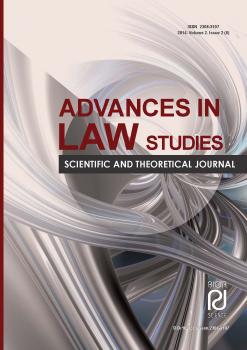В статье на основе изучения норм административного и уголовного права об ответственности за самоуправство делается вывод о необходимости совершенствования административного законодательства в части определения субъективной стороны самоуправства.
самоуправство; субъективная сторона; вина
In accordance with part 3 of Article 26.1 of The Code of Administrative Offences of the Russian Federation (hereinafter the Offences Code) a subject to clarification with respect to a case concerning an administrative offence shall be the administrative guilt of the person. Forms of guilt are determined in Article 2.2.
In science and educational literature on administrative law there is insufficient attention paid to guilt of a person [1–3] . Usually it is restricted to the definition with the reference to relevant provisions of the Offences Code.
In addition, according to part 1 of Article 1.6 of the Offences Code a person held administratively responsible may not be subject to an administrative penalty otherwise than on the grounds and according to the procedure established by law. Above said also completely relates to the administrative guilt determination in every case of bringing a person to the administrative liability.
In spite of, at first sight, simple rules of determination of guilt and definite types of guilt, in practice there can be difficulties establishing a mental part of the offence.
For example let us consider corpus delicti of “Arbitrariness” provided by Article 19.1 of the Offences Code. In accordance with the Commentary to the Offences Code edited by N.G. Salisheva [4] and the Commentary edited by E.G. Lipatov and S.E. Channov [5] arbitrariness can be committed only intentionally. In the Commentary by A.B. Agapov [6] two forms of guilt, intent and negli gence, are admitted.
It seems that such differences in interpretation of the arbitrariness’ mental part hinge on the imperfection of its objective part definition. As L.L. Popov accurately notes, in most cases the intent may be determined only on the basis of analysis of all elements of the offence, and above all, its objective elements [1]. In other words, the mental attitude of a person to an act committed by him becomes apparent, first of all, in the external elements of offence.
1. Administrative law: course book, ed. by U.M. Kozlov, L.L. Popov. Мoscow, 2000. In Russian.
2. Administrative law: course book, ed. by L.L. Popov. Мoscow, 2011. In Russian.
3. Shishkina О.Е. Administrative prevention and liability according to the Russian law: manual. Vladivostok, 2009. In Russian.
4. Commentary to the Code of administrative offences of the Russian Federation, ed. by N.G. Salischeva. Мoscow, 2009. ConsultantPlus, in Russian.
5. Paragraph-by-paragraph Commentary to the Code of administrative offences of the Russian Federation, ed. by E.G. Lipatov and S.E. Channov. Мoscow, 2008. ConsultantPlus, in Russian.
6. Agapov A.B. Paragraph by paragraph Commentary to the Code of administrative offences of the Russian Federation. Expanded, with judicial practice materials. Moscow, 2004. ConsultantPlus, in Russian.
7. Kozlov U.M., Popov L.L. Administrative law: course book. Мoscow, 2000. In Russain.
















